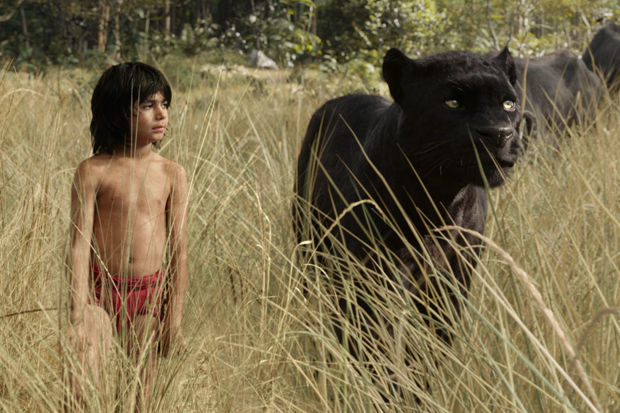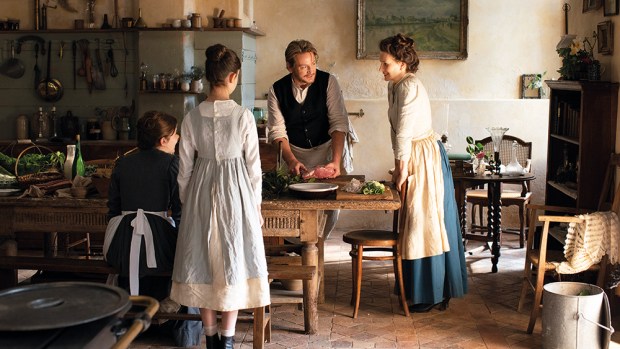This Jungle Book is Disney’s remake of its animated classic of 1967, as beloved by all generations thereafter. Warner Bros also has a remake in the pipeline, directed by Andy Serkis, and due for release in 2018, so it looks as though we’ve reached peak Jungle Book remake, although I personally won’t be happy until Quentin Tarantino has a shot: ‘I’ve reached the top, but had to stop and that’s what’s bothering me …mother fucker!’
Many are scornful of these ‘reimaginings’, as they’re called, saying it indicates that Hollywood lacks original ideas. There may be some truth in this, but if we only ever held out for original ideas, we’d never have had Billy Wilder’s Some Like It Hot (a remake of the French film Fanfares of Love) or The Maltese Falcon, which had been adapted twice before, and which no one has ever understood, but is considered a classic all the same. Also, the history of cinema is the history of technology. Sound. Colour. CGI. 3D. So as technology evolves you can, I think, legitimately make the same film, but differently. And there’s no reason why different versions can’t happily coexist. Everyone spiralizes their vegetables now, but it doesn’t mean the carrot as a carrot has ceased to be. This is a roundabout way of saying don’t give me gyp about this Jungle Book, which, as it happens, is immersive and engaging and a success in its own particular way.
This is a live-action/CGI reboot, directed by Jon Favreau (Swingers, Elf, Iron Man …Elf!), and even though the 3D glasses pinch, as they always do, it is stunning to look at, and you will marvel. It is wondrously detailed — breathtakingly detailed. You can see every leaf on every tree, every hair on every beast, every pore on every snout, every feather on every bird. It feels more real than if it were real. It feels as if you’re there. In other words, this takes you, visually, where hand-drawn cartoons never have, and never will, and I include Scooby-Doo. (Love Scooby-Doo, but never properly felt I was there, on that ghost train.)
It is narrated by the black panther Bagheera (Ben Kingsley, voice of) who has watched over Mowgli, the orphaned ‘man-cub’, since he was a baby. Mowgli (as played by Neel Sethi, who is quite adorable in that American cutesy way) is the only live-action figure. He was ‘filmed in downtown LA’, as the end credits note, but as he scampers up trees and swings from branches and generally interacts with the landscape you would never know. Mowgli loves his jungle life, but as Bagheera tells him, it’s time to leave the wolf family that raised him — I welled up at this; I cannot lie — for his own species in the ‘man-village’.
So far, so familiar. But this doesn’t then settle for being the tale of a small boy brought up in the wild to speak American and sing up-tempo songs while juggling mangoes. This isn’t The Revenant for kiddies exactly, but it is far darker, more hardcore than the original, and more faithful to the Rudyard Kipling stories, with treacherous landscapes, deaths, woundings, claws-out fights and a Shere Khan (the tiger; Idris Elba) so fearsome and so disfigured by ‘the red flower’ (the animals’ name for ‘fire’) that even I found him quite terrifying. And as for Kaa (Scarlett Johansson), she is everything an evil snake should be: fat, obscenely slithery, with hateful, mesmerisingly yellow eyes.
As Mowgli treks to the man-village, the basic structure of the film remains the basic structure of most films of this type: jeopardy, downtime, jeopardy, downtime, jeopardy, jeopardy, downtime. The best downtime occurs when the bear, Baloo (Bill Murray), arrives on the scene, as he’s big and silly and comical — the film was in desperate need of some humour by this point — and sings ‘Bare Necessities’ while Mowgli sits on his belly and they float down the river. It’s idyllic until Mowgli — jeopardy alert! — is kidnapped by those pesky monkeys and taken to a spectacular ruined city as ruled by King Louie (Christopher Walken), a giant, malevolent orangutan who wants Mowgli to ‘summon the red flower’. Walken gets to sing ‘I Wanna Be Like You’, which, racist undertones aside (you can look up that debate, if you’ve the mind), is just perfect somehow.
The fact that we’ve all seen the original means that we can’t unsee it, and therefore can’t help noting certain absences. Only two songs are reprised. My favourite character, the elephant Colonel Hathi, is missing. John, Paul, George and Ringo do not appear as vultures. There is no little girl at the end, and the ending itself seems to suggest different species can cohabit very nicely, thank you. The film is told as an old-fashioned adventure, with no icky messages about belonging, and it is set in a world so miraculously rendered you won’t care it’s been done before, because it’s never been done like this.
Got something to add? Join the discussion and comment below.
Get 10 issues for just $10
Subscribe to The Spectator Australia today for the next 10 magazine issues, plus full online access, for just $10.
You might disagree with half of it, but you’ll enjoy reading all of it. Try your first month for free, then just $2 a week for the remainder of your first year.














Comments
Don't miss out
Join the conversation with other Spectator Australia readers. Subscribe to leave a comment.
SUBSCRIBEAlready a subscriber? Log in